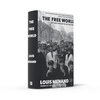New, Quality Books - 50-90% off, over 2500 titles
Your basket is empty.
Categories Entertainment/Showbiz CLUBLAND: How the Working Men's Club Shaped Britain
Categories Modern History/Current Affairs FREE WORLD: Art and Thought In The Cold War
Categories War & Militaria REBELS AGAINST THE RAJ: Western Fighters for India's Freedom
Categories War & Militaria IMAGES OF THE NATIONAL ARCHIVES: Cold War
Categories Humour CRITICAL TIMES
Categories Humour 10,000 NOT OUT: The History of The Spectator 1828-2020
Categories Travel & Places HOLIDAYS AND HIGH SOCIETY: The Golden Age of Travel
Categories Modern History/Current Affairs NO TRADESMEN AND NO WOMEN
Categories Last Chance to buy! ECONOMICS FOR THE COMMON GOOD
Categories Religion & Philosophy HOW I BECAME A SOCIALIST
CLUBLAND: How the Working Men's Club Shaped Britain
Book number: 93154
Product format: Hardback
In stock
£4.00
Customers who bought this product also bought
|
|
|
|
|
|
|
|
Browse these categories as well: Entertainment/Showbiz, Modern History/Current Affairs, Great Britain, Maps & the Environment
FREE WORLD: Art and Thought In The Cold War
Book number: 93157
Product format: Hardback
In stock
£6.00
Customers who bought this product also bought
|
|
|
|
|
|
|
|
Browse these categories as well: Modern History/Current Affairs, Religion & Philosophy
REBELS AGAINST THE RAJ: Western Fighters for India's Freedom
Book number: 93165
Product format: Hardback
In stock
£6.50
Customers who bought this product also bought
|
|
|
|
|
|
|
|
Browse these categories as well: War & Militaria, Modern History/Current Affairs
IMAGES OF THE NATIONAL ARCHIVES: Cold War
Book number: 93213
Product format: Paperback
In stock
£3.50
Customers who bought this product also bought
|
|
|
|
|
|
|
|
Browse these categories as well: War & Militaria, Modern History/Current Affairs
10,000 NOT OUT: The History of The Spectator 1828-2020
Book number: 93273
Product format: Paperback
In stock
£9.00
Customers who bought this product also bought
|
|
|
|
|
|
|
|
Browse these categories as well: Humour, Modern History/Current Affairs
HOLIDAYS AND HIGH SOCIETY: The Golden Age of Travel
Book number: 93285
Product format: Paperback
In stock
£6.50
Customers who bought this product also bought
|
|
|
|
|
|
|
|
Browse these categories as well: Travel & Places, Modern History/Current Affairs
NO TRADESMEN AND NO WOMEN
Book number: 93296
Product format: Hardback
In stock
£4.00
Customers who bought this product also bought
|
|
|
|
|
|
|
|
Browse this category: Modern History/Current Affairs
ECONOMICS FOR THE COMMON GOOD
Book number: 93487
Product format: Hardback
In stock
£9.00
Customers who bought this product also bought
|
|
|
|
|
|
|
|
Browse these categories as well: Last Chance to buy!, Modern History/Current Affairs
HOW I BECAME A SOCIALIST
Book number: 93395
Product format: Paperback
In stock
£3.50
Customers who bought this product also bought
|
|
|
|
|
|
|
|
Browse these categories as well: Religion & Philosophy, Modern History/Current Affairs















































































